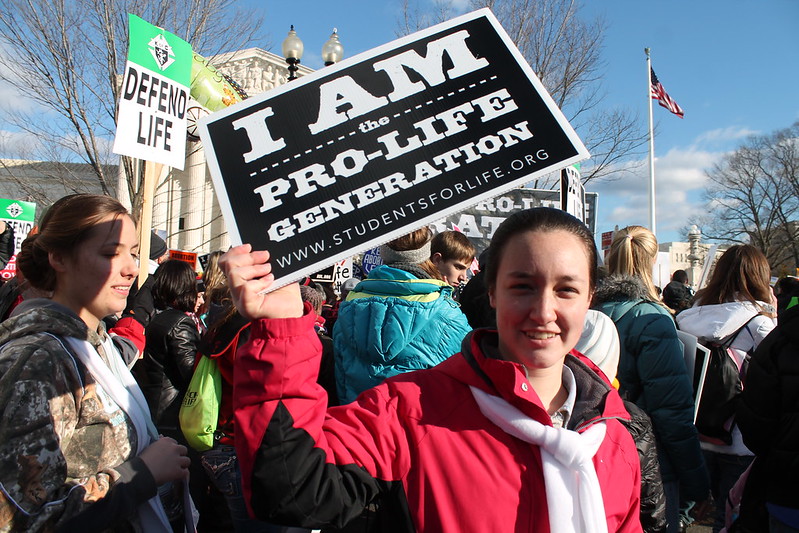I’m aware that not everyone is as concerned with abortion as I am. In fact, abortion falls fairly low on the list of “important issues” when voters are in the process of considering candidates. Only people like me, who are profoundly pro-life, or those who are extreme in their support of abortion rights, focus on it. In that ironic and bizarre way, I have more in common with the head of Planned Parenthood than the vast majority of Americans have with either of us.
But what happened Monday evening was seismic, and its impact is felt by everyone, including those who are more concerned with when or whether Joel Embiid is reactivated to play against the Miami Heat.
If Roe v. Wade is overturned, as seems likely based on the leak of Justice Alito’s draft majority opinion, abortion will not disappear. It will simply cease to be a federal right, left to the states to legislate and regulate. That’s the way it was until 1973, and even though I think it should be completely banned (exception: to save the mother’s life), that’s the way it should be in a democracy. Most Americans are comfortable with some limits on abortion, and if they live in a state that has those limits and they still want to end their pregnancy, they can travel to a more hospitable jurisdiction.
But after almost 50 years of legalized abortion, some people have gotten the idea that it’s a constitutional, unassailable right. They talk about “super precedents,” and “right to choose,” and “reproductive justice,” and all of these empty phrases that sound nice in campaign ads but that really add up to this: We want what we have gotten used to, unlimited autonomy when it comes to pregnancy.
And that’s where it gets interesting. If Roe falls and the states take control of abortion, the people who make the laws in those states will have an enormous amount of power. And in Pennsylvania, we have two crucial elections looming, which will determine whether our next governor is likely to sign or veto pro-life legislation and whether our next senator will vote to codify abortion rights in federal law.
At the outset, I don’t expect most Pennsylvanians agree with me that abortion should be criminalized except in cases where the life of the mother is in danger. You don’t have to tell me that my view is to the right of many Republicans and even a lot of run-of-the-mill conservatives. I can’t even get an “amen” from most of my Catholic friends, not to mention some high-profile priests like Jesuit James Martin. But at the very least, most Americans think there should be some significant limits on the procedure, depending upon the circumstances of the pregnancy.
When I helped moderate a debate of Republican senatorial candidates for the Delaware Valley Journal last month, I asked the four local candidates, Kathy Barnette, Jeff Bartos, George Bocchetto, and Sean Gale, what their views were on abortion. Gale was the most overtly passionate stating, “It’s truly a stain on this country, which is why I’ll be the most pro-life senator in the U.S. Senate.” Barnette mentioned her own origins story, revealing that she was a child of rape, and noted, “Based on my experience, I truly believe that life begins at conception, and I will make sure to fight for that when I’m in the Senate.” Bartos took aim at the Democrats currently in Congress observing, “When you have 47 Democrats who voted for legislation on late-term abortion, they will have to answer many questions come election time this November.” And George Bocchetto, who grew up in an orphanage in New York stated that “I wouldn’t be here today if Roe v. Wade were law during my birth, which is why I’m forever grateful that I could survive and thrive the way I did.”
Those were personal answers, deeply felt, and fairly representative of the GOP position on abortion. Contrast that with the Democrat candidates for the Senate. When asked at a recent debate if there were any limits on abortion that he would find appropriate, John Fetterman replied, “I don’t believe so, no.” He then doubled down, declaring that he wanted to codify Roe into statutory law to essentially frustrate the Supreme Court. Conor Lamb, Fetterman’s “moderate” opponent has gone on record saying, “I think that the right to choose is a right all the way through pregnancy.”
“All the way through pregnancy” is shorthand for late-term abortion. The comments were in response to a question about the Women’s Health Protection Act, and whether he would be able to support any restrictions on a woman’s right to choose. Apparently, he can’t.
As far as the gubernatorial race, every Republican candidate has come out as being pro-life, even if some like Charlie Gerow are more vocal than others. De facto Democratic candidate Josh Shapiro has made no secret that he strongly supports abortion, including late-term abortion.
It takes a lot to come out and say that a woman should be able to have an abortion whenever she wants. There is something particularly ghoulish in a person who thinks that abortion is “okay” and should not be barred at any moment before the crowning of the baby’s head. And I find it particularly ironic that the type of woman who thinks men can’t have an opinion on abortion is perfectly happy with these men, and these opinions.
If your primary concern this election cycle is something other than abortion, I understand where you might actually spend the next few weeks and months examining the candidates’ platforms and positions. But what happened Monday night changed the whole landscape.
Follow us on social media: Twitter: @DV_Journal or Facebook.com/DelawareValleyJournal

